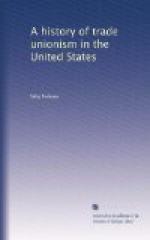The American political party system antedates the formation of modern economic classes, especially the class alignment of labor and capital. Each of the old parties represents, at least in theory, the entire American community regardless of class. Party differences are considered differences of opinion or of judgment on matters of public policy, not differences of class interest. The wage earner in America, who never had to fight for his suffrage but received it as a free gift from the Jeffersonian and Jacksonian democratic movements and who did not therefore develop the political class consciousness which was stamped into the workers in Europe by the feeling of revolt against an upper ruling class, is prone to adopt the same view of politics. Class parties in America have always been effectively countered by the old established parties with the charge that they tend to incite class against class.
But the old parties had on numerous occasions, as we saw, an even more effective weapon. No sooner did a labor party gain a foothold, than the old party politician, the “friend of labor,” did appear and start a rival attraction by a more or less verbal adherence to one or more planks of the rising party. Had he been, as in Europe, a branded spokesman of a particular economic class or interest, it would not have been difficult to ward him off. But here in America, he said that he too was a workingman and was heart and soul for the workingman. Moreover, the workingman was just as much attached to an old party label as any average American. In a way he considered it an assertion of his social equality with any other group of Americans that he could afford to take the same “disinterested” and tradition-bound view of political struggles as the rest. This is why labor parties generally encountered such disheartening receptions at the hands of workingmen; also why it was difficult to “deliver the labor vote” to any party. This, on the whole, describes the condition of affairs today as it does the situations in the past.
In the end, should the workingman be pried loose from his traditional party affiliation by a labor event of transcendent importance for the time being, should he be stirred to political revolt by an oppressive court decision, or the use of troops to break a strike; then, at the next election, when the excitement has had time to subside, he will usually return to his political normality. Moreover, should labor discontent




